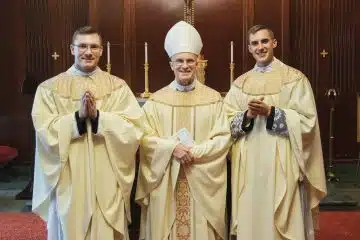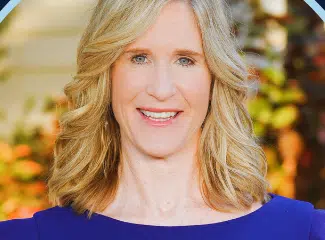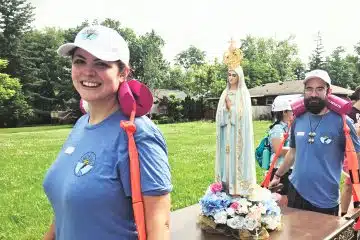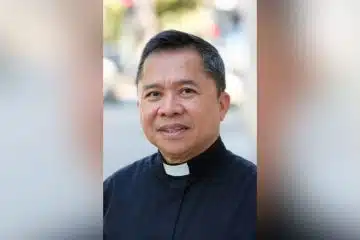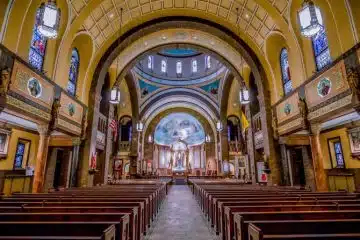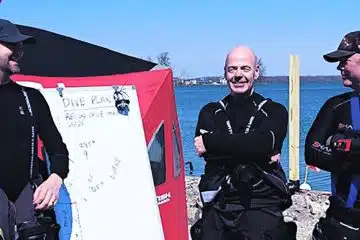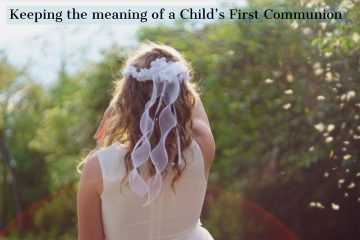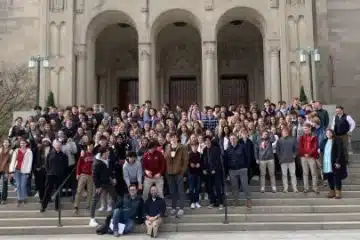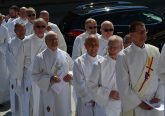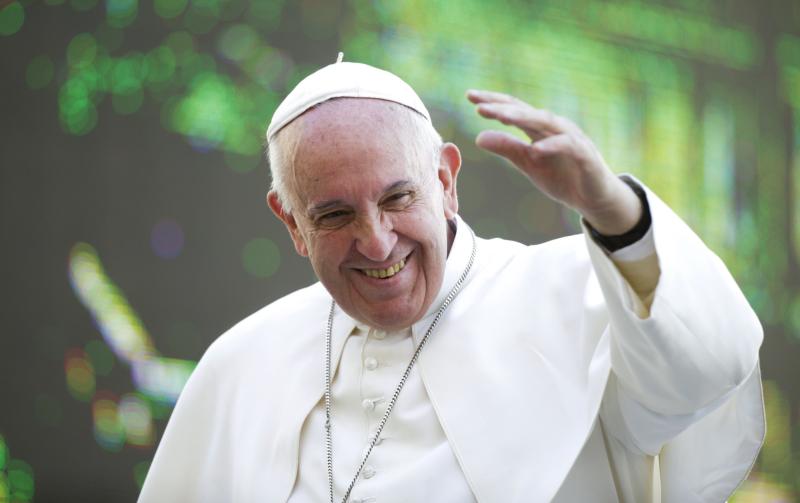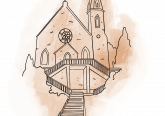Deacons gather for education, fellowship
Wednesday, August 5, 2009
By Eileen Connelly, OSU
ARCHDIOCESE — Some 130 deacons and their wives from the across the country gathered at Xavier University’s Cintas Center July 19-22 for the annual conference of the National Diaconate Institute for Continuing Education (NDICE). The overall theme for this year’s gathering was “Scripture: the Foundation for Diakonia,” with most of the presentations geared toward examining the scriptural foundations for the deacons’ ministry of service to others.
NDICE originated in 1973 in Collegeville, Minn., when a small group of deacons began meeting informally for brotherhood and sharing. The organization grew over the years, ratifying its constitution in 1977. Today its purpose is to build up the community of deacons so that they may recognize their full potential in Jesus Christ and the church. The annual conference offers them the opportunity for education, community building and support as they serve in traditional ministries and explore new ways to serve God and the church.
 |
| Father Thomas Kalita gives the keynote address at the National Diaconate Institute for Continuing Education (NDICE) at Cinta Center. (CT/E.L. Hubbard) |
The 2099 conference opened with a Mass celebrated by Cincinnati Coadjutor Archbishop Dennis M. Schnurr. The keynote address was given by Father Thomas Kalita, a former instructor in sacred Scripture for the permanent diaconate formation program of the Archdiocese of Washington and current pastor of St. Peter Parish in Olney, Md.
In his address, Father Kalita presented three models from the Books of Genesis, Exodus and Leviticus of how Scripture illustrates ways for those in ministry to be of service to God’s people. The Book of Exodus, for example, “shows how both in creating the world and then recreating the world after original sin, that one way of seeing God’s purpose was to bring order out of chaos,” explained Father Kalita. “One of the things deacons do is come into peoples’ lives when there is chaos and trouble. They show how God’s presence can bring peace, strength and stability.”
“We think of Leviticus as being a lot of legal material, which it certainly is, but why does God give legal material? To serve as a guide for how His people are to treat one another to maintain covenant,” Father Kalita continued. “When God began to call the prophets to preach in His name, to preach His message, what did they use for their basis but the laws of the covenant? Deacons who are called to proclaim God’s word now to the liturgical assembly must consider the words of the new covenant, specifically the Gospels, as their basis for preaching. We don’t preach our own message; we preach what God spoke years ago.”
Among the other conference presenters was Bishop Octavio Cisneros, auxiliary bishop of the Diocese of Brooklyn, who noted how the Christian understanding of diaconal service is “to give of oneself for the good of another. The ultimate gift of service to one another is the gift of self and that is what Christ did on the cross,” he said. “That conquering of death on the cross was a moment of service. The diaconate was born in Christ’s self gift on the cross and deacons are called to put this experience on the cross into practice in their daily lives and ministries.”
“In order to be Christ’s servant to others, the deacon has to be Christ-like,” Bishop Cisneros added. “One can never forget this dimension. In order to give bread, you must be bread.”
Local speakers were also featured at the conference, including Father Timothy Schehr, professor of biblical studies at the Athenaeum of Ohio/Mount St. Mary’s Seminary. In his talk, Father Schehr examined a number of biblical characters, including Jacob, Isaiah, Jeremiah, Paul and Peter, and discussed what their experiences demonstrate about service to others. For example, Paul and his followers “were a model of Christian community,” Father Schehr said. “They cared for each other and were interested in the spiritual journeys of one another. I’m always impressed by the network of community Paul was able to sustain during his missionary work.”
Other national and local presenters, workshops, daily Mass and a banquet dinner rounded out the conference. Also on the agenda were a business meeting of the deacon wives and the election and installation of NDICE officers. They are: Deacon Ralph O’Blenness, liturgy chairmen; Joe Wenzler, treasurer; Deacon Hank Babin, executive secretary; Max Roadruck, past president; Deacon Joseph Wright, president elect; Deacon Robert Markert, president; and Sharon Belcher as the wives representative.
For those in attendance, the conference was both educational and affirming of their ministries. Deacon Roadruck, who serves at Mary, Help of Christians Parish in Fairborn, said the found Father Kalita’s presentation to be particularly meaningful. “He spoke about bringing order out of chaos and that is what I try to do when people are in a crisis situation. I try to give them hope and help them make sense of what they’re going through. That’s the idea of what diakonia is all about — trusting God to help bring order out of chaos.”
“I believe the conference gave participants a better appreciation of Scripture and the examples of service that you wouldn’t normally consider,” Deacon Roadruck added. “In the beginning of Genesis, Cain asks ‘am I my brother’s keeper?’ That question resonates throughout Scripture and the answer is “yes’”
Deacon Greg Cecere, pastoral associate at Queen of Apostles Parish in Dayton, said the conference was spiritually renewing. “What affected me most and what brought me the most refreshment of soul were the morning and evening prayer sessions and daily Mass. It was like being surrounded by a chorus of voices in song, and it was wonderful. All of us came together to renew ourselves at the same well and praise God in prayer and music…to make a joyful noise unto the Lord. I came away renewed and refreshed and supported by the very persons I came to support. I came away with the knowledge that my brother deacons are still in love with their own ministry after having served the church for many years, and I am happy to be in that number.”
“I believe all of the presenters were great this year, but I especially remember Bishop [Robert} Morneau {auxiliary bishop of Green Bay} challenging the deacons to view their ministries of service as a way to convince people that they are unconditionally loved by God,” said Barry Mersmann, director of the archdiocesan Office of the Diaconate. “He said that the diaconate is a ‘call to radiate God’s light/to reveal God’s peace and joy.”


